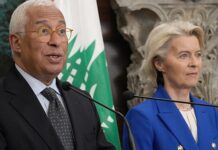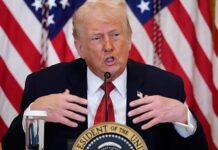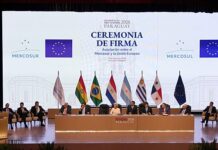Published on

ADVERTISEMENT
The US President is seeking to impose his agenda and political programme on Europeans, according to a report published today (Tuesday) by the European Council on Foreign Relations (ECFR).
According to the author of the study, Pawel Zerka, the American leader is using various channels to redraw the transatlantic links along the lines of his conservative values and his discourse on freedom of expression.
These are not all political disputes, but the visible part of a “cultural war”, according to Zerka.
“I don’t think anyone will question the fact that this administration is trying to interfere in the domestic politics of EU Member States and that if Donald Trump were to succeed on this front, it would allow the ideological centre of European politics to shift to the right and towards the issue that Donald Trump considers crucial for today’s democracies,” the analyst claims.
Zerka cites the US Vice-President’s speech earlier this year at the Munich Security Conference. J.D. Vance’s remarks set the tone for the ideological debate that Washington seeks to frame, according to Zerka, referencing the decline in freedom of expression on the European continent and the growing gulf between values on either side of the Atlantic.
According to the report by the European Council on Foreign Relations, the confrontation is exacerbated by a backdrop of political “humiliation” of Europe.
“I think that it is of course the European leaders, governments and institutions that have left a lot of room for humiliation,” explains Pawel Zerka. “Whether it’s tariffs, the tariff war with the United States, the NATO summit and the question of increasing defence spending, or the way European leaders are treated in the peace negotiations over Ukraine, where they practically have to knock on the door to be listened to, otherwise they’re not in the room,” he added.
These tensions, provoked by the White House, are pushing EU leaders to react rather than set their own agenda, the document suggests.
Sentiment in favour of the EU
However, the analysis stressed that European sentiment remains strong despite the political blows dealt by Washington. According to the latest data published by Eurostat, 52% of citizens have confidence in the common project, the highest level since 2007.
For Zerka, there are therefore forces on which the EU can build, especially as the expectations of Europeans have also evolved.
“In many places where people used to see the EU mainly as an economic entity, a trading bloc, a market, they have begun to realise that Europe plays an important role in terms of geopolitics, relations with other world powers, but also in terms of defending democratic values that are under threat both outside and inside Europe,” he said.
The author of the report calls on European leaders to step out of their comfort zone and build step by step strategic autonomy in defence, technology and energy policy, and to complete the single market.
But the analysis underlined that the EU is far from united. The US President has political connections in Europe through the leaders of Hungary, Italy and Slovakia, Zerka points out.














